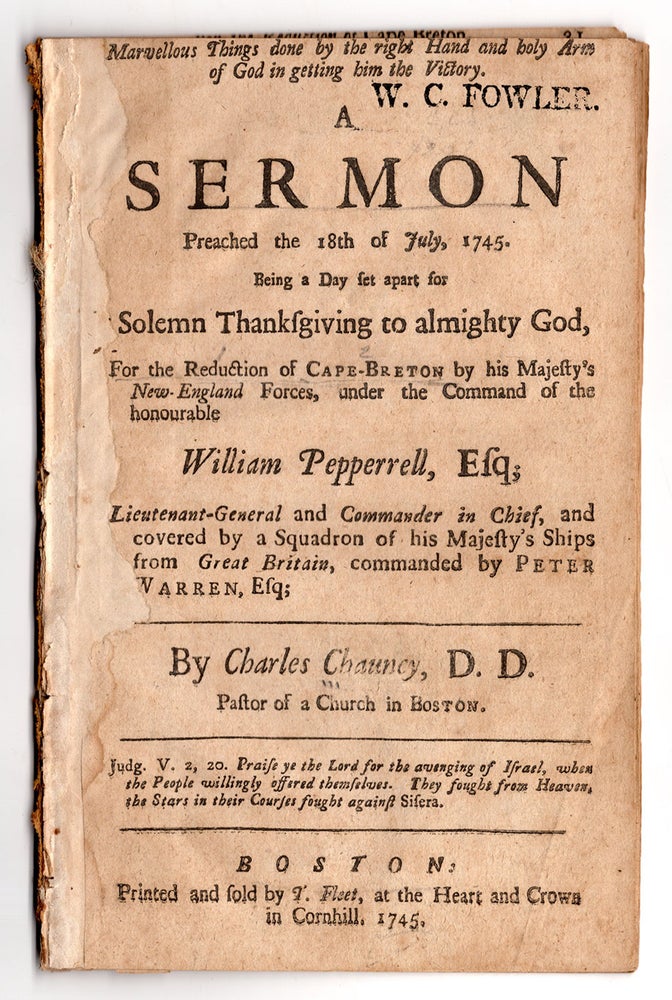Marvellous Things done by the right Hand and holy Arm of God in getting him the Victory. A Sermon Preached the 18th of July, 1745. Being a Day Set Apart for Solemn Thanksgiving to Almighty God, for the Reduction of Cape-Breton by His Majesty's New-England Forces, under the command of the honourable William Pepperell, Esq; Lieutenant-General and Commander in Chief, and covered by a Squadron of his Majesty’s Ships from Great Britain, commanded by Peter Warren, Esq.
Boston: Printed and sold by T. Fleet, at the heart and Crown in Cornhill, 1745. 12mo (7.125” x 4.625), no wrappers, removed from sammelband. [2], 5–23 pp. Ownership stamp at upper right of title page: “W. C. Fowler.” CONDITION: Good, old paper repair to loss along inner edge of title leaf, 1.5” tear to second leaf, dampstain at inner margin of last page, running title trimmed close and sometimes nicked. One of the best contemporary accounts of the 1745 Siege of Louisbourg, with considerable detail on strategy, defenses, munitions, men, etc. by the influential American clergyman Charles Chauncy. Dedicating some eight pages of his sermon to the siege, Chauncy addresses the events leading up to it, the remarkably speedy preparations for it, and the circumstances and events of the siege itself. Admitting that “It may seem strange, that such a Country as this, so weak in Strength, so unskilled in the Use of military Weapons, so distressed for want of Money, should make an Attempt upon so strong and fenced a City as Louisbourg, at Cape-Breton,” Chauncy credits Providence for the very idea of the siege, “partly, by permitting the French, last Year, to take Canso, and invade Annapolis, and form a Scheme to invade it again this Year; hereby opening to our View, in the clearest Manner, not only the Justice, but Necessity of reducing this Place, from whence we were exposed to suffer so much.” Chauncy then addresses various favorable circumstances during the battle and its leadup, from fair weather and the English troops’ preservation from small pox “Which is the more worthy of special Notice, because, if it had prevailed, it would unavoidably have put an End to the intended Expedition,” to the mid-siege arrival of a British ship from the West Indies in “time enough to take the Vigilant, a fine new 64 Gun Ship, designedly sent from France for the Protection of the French, and Distress of the English.” He then narrates the various providential turns of the siege, including the early abandonment by the French of “their Grand-Battery, allowing us to enter and take Possession of it without the least Opposition” and the overall low casualty rate among the English. Finally, “the most astonishing Article in the Conduct of Providence, was its disposing the Enemy, by surrendering their City and Fortresses, to prevent that general Assault, both by Sea and Land, which had been resolved upon, and must have occasioned a most dreadful Effusion of Blood on both Sides.” Charles Chauncy (1705–1787), a 1721 graduate of Harvard, served at Boston’s First Church—the city’s first Congregational church—from 1727 until his death, first as assistant minister and then as pastor. He was a prominent opponent of the First Great Awakening, stirred most famously by Jonathan Edwards, and became a staunch supporter of the Patriot cause during the Revolution. Chauncy also authored two important epistolary accounts of battles in the French and Indian War: A Letter To a Friend; Giving a concise, but just, Account, according to the Advices hitherto received, of the Ohio-Defeat, (Boston, 1755), about the Battle of Monongahela (July 9th, 1755), commonly known as Braddock’s Defeat; and A Second Letter to a Friend; Giving a more Particular Narrative of the Defeat of the French Army at Lake-George, by the New-England Troops, than has yet been published: Representing also the vast Importance of this Conquest to the American-British-Colonies (Boston, 1755), about the Battle of Lake George (September 8th, 1755). Scarce in trade. The last copy recorded in Rare Book Hub was offered in 1970 by the firm of Lathrop Harper. Not in the Streeter Sale. REFERENCES: Evans 5558; Sabin 12324; Gibbs, Norman B. and Lee W. Gibbs. “‘In our Nature’: The Kenotic Christianity of Charles Chauncy,” The Harvard Theological Review, Vol. 85., No. 2 (1992), p. 217.
Item #7519
Price: $2,750.00


